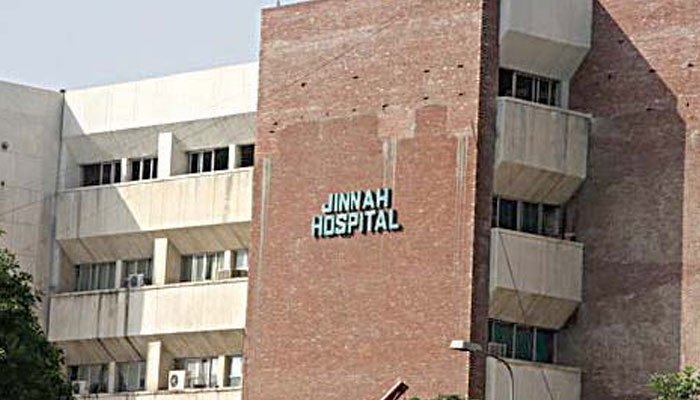JPMC designated focal point for suspected Coronavirus patients
A bus full of Chinese nationals, working on the nuclear power plant in Karachi, were taken to the Aga Khan University Hospital on Saturday on suspicion of having the Coronavirus infection after they reported having flu-like symptoms with difficulty in breathing, but after thorough investigation, none of them was found to be infected with novel Coronavirus (2019-nCoV), Sindh health department officials told The News on Tuesday.
“On Saturday last, as many as 27 Chinese nationals were brought to the Aga Khan University Hospital (AKUH) on complaints of flu-like symptoms and having difficulty in breathing. As many of these Chinese nationals had a history of travelling to their homeland in January 2020, they were suspected to have been infected with novel Coronavirus, but after thorough investigation none of them was found to be infected with the lethal virus,” an official of the health department said.
Officials said that of the 27 Chinese nationals, three were identified as suspects for having the lethal viral infection, while the AKUH also identified five more suspects for having the Coronavirus infection, as they too had symptoms of flu-like disease with difficulty in breathing, but all these eight suspects were cleared of having the Coronavirus infection.
“Eight suspected patients were identified by the AKUH authorities for potentially having Cornonavirus infection. One case had no travel history to China (but he was in contact with Chinese nationality persons), six had travel history from China during January 2020 and one had travel history from China during June 2019,” the health department official said.
He maintained that all of these suspects had flu-like symptoms, and seven were employed at the Karachi Nuclear Power Plant (KANUPP). Of these, eight left the hospital against medical advice while four were discharged. Two suspected cases were defined as “not a case” as per the AKUH case definition and after observation under treatment.
“So far, not a single confirmed case of novel Coronavirus (2019-nCov) has been reported in Sindh. Health department and its disease surveillance officials are highly vigilant while special attention is being paid to those who travelled to China during the last few months,” the official said.
He maintained that they were in close coordination with the AKU Hospital for timely sharing data while a surveillance mechanism had been established and sentinel sites were developed. Communication was also developed with health authorities and other stakeholders, while health advisory regarding Coronavirus was communicated to every healthcare facility. Advising people to stay at home until symptoms have resolved (at least 24 hours after fever has defervesce/subside of fever), the official said people should avoid close contact with others especially those at high risk for severe infection. They should cover mouth and nose with tissue when sneezing or coughing.
“People should regularly wash hands with soap and water or disinfect with an alcohol-based hand rub regularly. Limit the number of visitors, wipe down surfaces that are frequently touched or shared (doorknobs, remote controls) with a standard household disinfectant.”
JPMC a focal point
The Sindh health department has declared Jinnah Postgraduate Medical Centre (JPMC) Karachi as the “focal point” for novel Coronavirus 2019-nCov in Sindh and asked its executive director, Dr Seemin Jamali, to start training of JPMC staff to deal with the contagious viral infection at the earliest.
The health department notification issued on Tuesday asked the JPMC administration to establish isolation rooms for suspected patients, urgently arrange personal protective equipment and ensure availability of the supportive medicine.
Dr Seemin Jamali said they had started establishing isolation rooms to keep suspected Coronavirus patients while they had also acquired some personal protective equipment from the international donor agencies, but she added that they would need the provincial and federal government’s support in this regard.
-
 Halsey's Fiance Avan Jogia Shares Rare Update On Wedding Planning
Halsey's Fiance Avan Jogia Shares Rare Update On Wedding Planning -
 Instagram Head Adam Mosseri Says Users Cannot Be Clinically Addicted To App
Instagram Head Adam Mosseri Says Users Cannot Be Clinically Addicted To App -
 James Van Der Beek Was Working On THIS Secret Project Before Death
James Van Der Beek Was Working On THIS Secret Project Before Death -
 Las Vegas Father Shoots Daughter's Boyfriend, Then Calls Police Himself
Las Vegas Father Shoots Daughter's Boyfriend, Then Calls Police Himself -
 'Hunger Games' Star Jena Malone Shocks Fans With Huge Announcement
'Hunger Games' Star Jena Malone Shocks Fans With Huge Announcement -
 Ex-OpenAI Researcher Quits Over ChatGPT Ads
Ex-OpenAI Researcher Quits Over ChatGPT Ads -
 Prince William Criticized Over Indirect Epstein Connection
Prince William Criticized Over Indirect Epstein Connection -
 'Finding Her Edge' Creator Explains Likeness Between Show And Jane Austin Novel
'Finding Her Edge' Creator Explains Likeness Between Show And Jane Austin Novel -
 Margot Robbie Delivers Sweet Message Ahead Of Valentine's Day
Margot Robbie Delivers Sweet Message Ahead Of Valentine's Day -
 How AI Boyfriends Are Winning Hearts In China: Details Might Surprise You
How AI Boyfriends Are Winning Hearts In China: Details Might Surprise You -
 Blake Lively Mocked Over 'dragons' After Latest Court Appearance
Blake Lively Mocked Over 'dragons' After Latest Court Appearance -
 Gmail For Android Now Lets Users Create Labels On Mobile
Gmail For Android Now Lets Users Create Labels On Mobile -
 Emma Slater Reveals Final Moments With James Van Der Beek Before His Death
Emma Slater Reveals Final Moments With James Van Der Beek Before His Death -
 Princess Kate Makes Surprise Visit To Support Mental Health Initiative
Princess Kate Makes Surprise Visit To Support Mental Health Initiative -
 Reese Witherspoon Sparks Nostalgia With 'Green Sisters' Tribute To Jennifer Aniston
Reese Witherspoon Sparks Nostalgia With 'Green Sisters' Tribute To Jennifer Aniston -
 Royal Family Faces Fresh Crisis While Andrew's Controversy Refuses To Die
Royal Family Faces Fresh Crisis While Andrew's Controversy Refuses To Die




